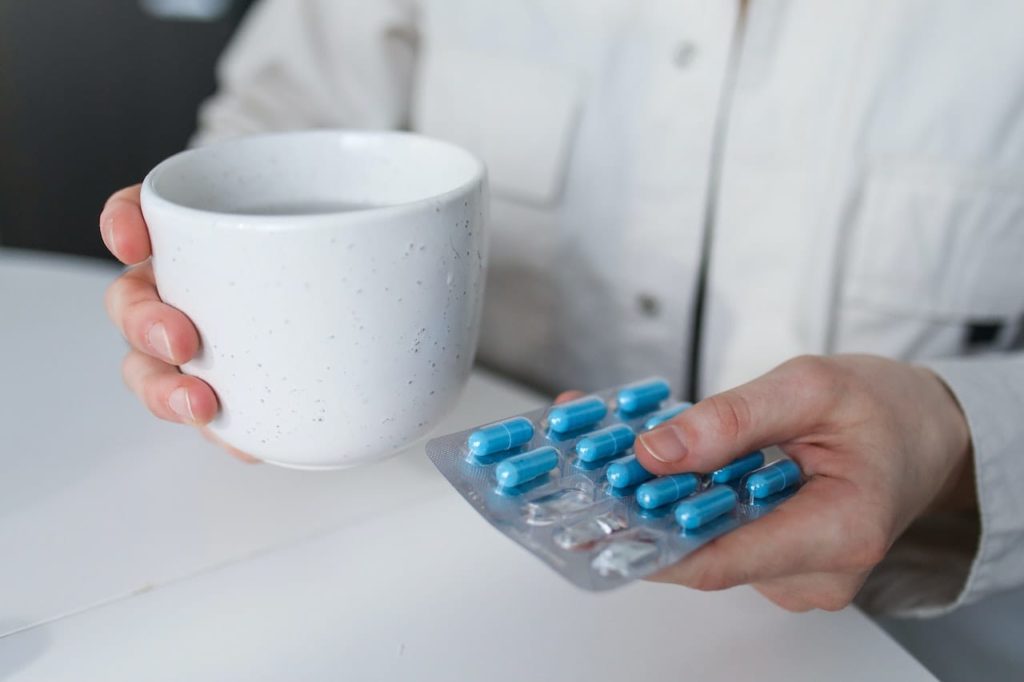We all experience anxiety occasionally as a natural reaction to upsetting life experiences. Everyone occasionally feels temporary anxiety that has no negative effects on daily life and can even be helpful.
However, on occasion, this common feeling that we name anxiety can also lead to more severe anxiety disorders or high-functioning anxiety, which can make it difficult for someone to lead a normal, healthy life. Other psychological or behavioral problems may be present in complicated anxiety disorders. If your anxiety is not merely episodic but is affecting your life, you may need expert treatment and psychotherapy.
There are various treatment methods and coping skills for anxiety. Medication is one of the finest approaches to overcoming anxiety problems. You may use prescription medications to treat mental health issues like anxiety but only with a doctor’s prescription. Hydroxyzine is one of them that may be prescribed to treat anxiety symptoms. (1)
Let’s take a closer look at hydroxyzine, how it treats anxiety, its appropriate dosages, any adverse effects, and all the other vital aspects.
What is hydroxyzine?
The drug hydroxyzine belongs to the antihistamine drug class. (2) In essence, hydroxyzine is an antihistamine comparable to over-the-counter (OTC) drugs like Benadryl; however, instead of being used as an OTC drug, it is utilized as a prescription drug because of its mechanism of action, which is similar to SSRIs.
Although there are several minors and even a few potentially severe adverse effects, the medicine is typically safe and effective at treating anxiety symptoms. The Food and Drug Administration has given it the go-ahead to treat generalized anxiety disorder.
Histamine, a chemical in the body that triggers allergy reactions, is inhibited by it. It also has the effect of reducing brain activity.
Hydroxyzine treats itching brought on by allergic skin reactions in both adults and children. It is also used to treat anxiety and tension in both adults and children, either on its own or in combination with other drugs. Hydroxyzine is also prescribed to adults and children in combination with other medications as a relaxant before and after general anesthesia for surgery.
Forms of hydroxyzine
Hydroxyzine is available as a liquid, tablet, or capsule for treating anxiety. Both hydroxyzine hydrochloride and hydroxyzine pamoate are forms of this drug. Hydroxyzine hydrochloride is solely accessible as a generic, whereas hydroxyzine pamoate is marketed in both generic and branded versions.
Anxiety can be treated with both hydroxyzine hydrochloride and hydroxyzine pamoate. The form in which each is offered distinguishes the two most significantly. While hydroxyzine pam is only accessible in capsule form, hydroxyzine HCL is offered in tablets and liquid.
One type of medication might function better for you, particularly than the other, or you might prefer it.
The appropriate dosage of this drug for your treatment plan for anxiety can be determined by your doctor and you collectively.
How does hydroxyzine work for anxiety?
Most medical professionals concur that hydroxyzine affects two molecules in our bodies—histamine and serotonin—to cure anxiety.
As an antihistamine, it works by limiting the absorption of histamines into the brain and other parts of the body. (3) Histamines are the natural chemical messengers in your body that help with everyday functioning and are also engaged in your immune reaction. (4) When a foreign substance enters your system and is perceived as a risk, histamines encourage the inflammatory response that results in allergy symptoms. Inhibiting histamine impulses, hydroxyzine works as a CNS depressant. Allergy symptoms are reduced as a result. Other emotions, such as drowsiness and sadness, could also be brought on by it, which is one of the reasons it is taken to relieve anxiety.
It performs a serotonin antagonist role in addition to acting as an antihistamine. (5) By increasing the amount of serotonin accessible in your brain, hydroxyzine for anxiety works similarly to SSRIs, another prescription medicine used to treat anxiety.
Serotonin carries information between nerve cells in the brain and other parts of the body. (6) It is essential for maintaining a stable mood. It also has an impact on your general well-being, as well as your self‐esteem, optimism, and contentment. Serotonin deficiencies in the brain can lead to despair, anxiety, and sleep issues. Hydroxyzine acts as a serotonin antagonist to raise serotonin levels in the brain by preventing serotonin from being reabsorbed into brain nerves.

Dosage of hydroxyzine for anxiety
Most anxiety drugs must be used consistently to be effective. The dosage of hydroxyzine, however, is flexible.
Taking hydroxyzine as your sole anxiety medicine is not a long-term solution. It is usually administered for a brief period in addition to another longer-term anxiety medicine that is taken daily. Hydroxyzine can alleviate anxiety until the longer-term drug starts to take action. However, hydroxyzine should only be used when symptoms manifest.
Like other prescription drugs, hydroxyzine should only be taken as directed by your doctor, so adhere to the guidelines on your prescription.
50 to 100 mg up to three to four times daily, with or without meals, is the typical dosage for a healthy adult. Some individuals could also begin with a lesser dose. Children under six should take 50 mg daily in divided doses, while those over six should take a minimum of 50 to 100 mg daily in smaller doses.
Your doctor will provide instructions on when, how frequently, how to administer the medication, and how much you should take daily.
Stay calm if you forget your hydroxyzine dose. If you miss a dose, you should either take it as soon as you remember to or skip it and take your regular dose instead if it is nearly time for your next dose.
Your doctor may change your dose based on how you adjust to the drug. However, be careful not to change your medication’s dosage or abruptly stop taking it without consulting your doctor. Doing so could have unfavorable effects.
How long does it take for hydroxyzine to work for anxiety?
Compared to drugs like SSRIs, hydroxyzine has a relatively quick onset of action if you take it for anxiety. With hydroxyzine, you can notice your symptoms improve significantly fast, usually within hours of first consuming it. However, with SSRIs, you might need to take them for a few weeks before you show improvement in your anxiety symptoms.
Most people will begin to experience its effects in about 30 minutes and encounter its full impact within about 2 hours. Although it’s excellent that it starts working immediately, note that many possible adverse effects can also be felt immediately. The smart move is to contact your doctor immediately if you discover any.
For how long do hydroxyzine effects last?
The half-life of hydroxyzine is approximately 14 hours. As a result, your body needs roughly 14 hours to eliminate half of a dose of hydroxyzine. The average time for a medication to thoroughly vacate your system is five half-lives. This means that from your last dose of hydroxyzine, the drug will be in your body for roughly 70 hours. (7) The effects of hydroxyzine, nevertheless, typically last 3 to 4 hours.
Is hydroxyzine addictive?
Hydroxyzine does not form habits and is not a restricted substance. Neither has any withdrawal symptoms or dependency. It is a good option for individuals with minor symptoms of anxiety and those who do not want to consume a daily drug or a chemical under federal regulation.
Although hydroxyzine is not linked to the usual withdrawal symptoms, those who use it for a long time or who have grown accustomed to its advantages may experience more side effects when stopping. Withdrawal symptoms may appear if you stop taking your medication suddenly or miss multiple doses. The term “discontinuation syndrome” has been used to describe this. (8) You should gradually and safely reduce your dosage in consultation with your doctor to avoid withdrawal symptoms.

Hydroxyzine vs. Benadryl
Even though both hydroxyzine and Benadryl are antihistamines, they cannot both be used to alleviate anxiety. Benadryl, which is available over the counter and doesn’t need a prescription, is licensed to manage hay fever, allergies, and the common cold but not anxiety. However, since it could promote sleep, it is used for anxiety off-label.
Moreover, a 2015 study published in CMAJ found that long-term usage of Benadryl may raise your risk of dementia, although long-term use of hydroxyzine is thought to be harmless. (9)
There is a chance of developing a dependency on or abusing Benadryl, according to findings of another 2017 study that was published in Neurology Clinical Practice. (10) Nevertheless, those with a history of addiction may be at greater risk.
Due to its sedative impact, Benadryl is a helpful medication for sleeplessness and other sleep issues. (11) Benadryl is also used to treat Parkinson’s disease symptoms. However, not every patient should take hydroxyzine to alleviate their insomnia.
Can hydroxyzine help with sleep?
The use of hydroxyzine to promote sleep is not authorized. However, it can be utilized for this objective off-label. Everyone may experience hydroxyzine differently. The medication could have both sleepiness and insomnia as adverse effects.
Therefore, hydroxyzine could promote sleep. However, the medication may also keep you up. After taking hydroxyzine for a few days, you’ll better understand how it affects you.
Speak with your doctor and. assess the effects of the drug to discover more about using hydroxyzine as a sleep aid.
Side effects of hydroxyzine
The side effects of a drug can vary depending on your age, the prescribed dosage, and any other medication you may be taking.
Your doctor or pharmacist will give you more information regarding the possible adverse effects of hydroxyzine. They can also offer tips on how to lessen adverse effects.
Most hydroxyzine side effects are minor and should disappear as you become used to the drug.
Constipation, disorientation, dry mouth, general fatigue, headache, difficulty falling or staying asleep, nausea, difficulty concentrating, tiredness, and low blood pressure are only a few of the mild negative impacts of hydroxyzine that have been noted.
Many medications’ mild side effects may disappear in a few days or weeks. But if they start to affect you, see your doctor.
Although they are uncommon, serious adverse effects from hydroxyzine can happen. Call your doctor immediately if you have severe negative effects after taking hydroxyzine.
Atypical heart rhythm, long QT syndrome, skin responses, and allergic reactions are among the serious adverse effects of hydroxyzine.
How do you manage certain side effects?
One of the most prevalent side effects of hydroxyzine is sleepiness. It would be best to stop driving until you know how hydroxyzine influences you. After using hydroxyzine for a few days, sleepiness normally subsides. Tell your doctor, however, if your tiredness is excessive or persistent. They might suggest a smaller dosage of the medication for you. (12)
If you have heart issues, you run a more significant chance of experiencing low blood pressure from hydroxyzine. Additionally, it rises if you use monoamine oxidase inhibitors, a class of antidepressants. Informing your doctor about your medical conditions and the drugs you take before beginning hydroxyzine will help you avoid this.
While taking hydroxyzine, significant skin responses are possible. Blisters, fever, hives, itching, rashes, and skin irritation are possible signs of skin reactions. Any of these signs could indicate a medical emergency that requires immediate attention. In such a situation, contact your doctor and express your concerns right away. 13
Interaction of hydroxyzine with other drugs
Drug interactions could alter how your medications function or raise the possibility of significant adverse side effects. Numerous drugs and hydroxyzine can interact. Before you begin using hydroxyzine, make sure that any medication you already take does not interfere with hydroxyzine by consulting your doctor.
Keep track of everything you use and provide your doctor and pharmacist a copy of the list.
Inform your doctor if you are taking other medications that make you sleepy, including opioid painkillers, alcohol, marijuana, sleep aids, anticonvulsants like Neurontin, antidepressants like SSRIs, and other antihistamines. All your medications may have substances that make you sleepy, so read the labels carefully. Inquire with your pharmacist about the safe use of certain products.
Applying additional topical antihistamines may result in other adverse effects, so avoid doing so. Cetirizine and levocetirizine are quite similar to hydroxyzine. When using hydroxyzine, avoid utilizing these drugs.

Who should not take Hydroxyzine?
First and foremost, hydroxyzine should only be consumed with a physician’s advice and prescription. The recommended dosage will vary depending on the patient’s age, symptoms’ severity, underlying medical conditions, and the interval between doses. There are a few other situations in which hydroxyzine might not be the best option for you.
Pregnancy
Initially, during pregnancy, hydroxyzine use is not advised because it could harm the fetus. If you believe you may be pregnant or plan to get pregnant, consult your healthcare professional. According to studies, using hydroxyzine in the first trimester of pregnancy has been linked to an increased risk of birth abnormalities. While you are pregnant, there may be preferable alternatives. (14)
Old age
Due to potential adverse effects, hydroxyzine may not be recommended for individuals over 65. If you are in this age range, talk to your doctor about alternative drugs like hydroxyzine.
Phenylketonuria
Patients with phenylketonuria, a rare genetic disorder that increases blood levels of the brain-damaging amino acid phenylalanine, shouldn’t take hydroxyzine because the drug might also contain this amino acid.
Heart issues
According to a 2015 review, a patient should only use hydroxyzine under the continual supervision of a medical practitioner if they already have a high risk of arrhythmia, are taking medication that decreases their heart rate or raises the risk of QT prolongation, or both. If you have a family history of heart problems or have experienced them, you should mention them to your doctor or healthcare provider. Examples of heart problems include a slow or infrequent heartbeat, a heart attack, heart failure, or reduced blood potassium levels or magnesium. (15)
Focus based work
Since hydroxyzine may have sedative and sleep-inducing effects, patients should not drive or operate heavy machinery until they know how the medication impacts them. Being on hydroxyzine while engaging in activities that need high concentration levels puts them at risk of an accident.

Conclusion
It might be worthwhile to talk to your doctor about hydroxyzine if you’re seeking a quick-acting medicine that can be taken for a long time to manage anxiety.
Hydroxyzine is an antihistamine that can be used for various conditions. Both children and adults can benefit from this treatment approach for anxiety. It is only available with a prescription and is frequently administered with a long-term anxiety medicine like Buspar.
Hydroxyzine can make you drowsy, which may be helpful for those with anxiety-related sleeplessness, but can be problematic for those trying to do things like drive. However, each medication has its pros and cons. Follow the guidelines and take it in prescribed doses to avoid significant adverse effects.

